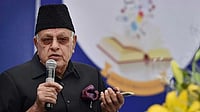Facebook has confirmed that it has banned Arakan Rohingya Salvation Army (ARSA) - a Rohingya militant group from its site, designating it a 'dangerous organisation'.
While the international community accuses Myanmar’s military of ‘ethnic cleansing’ against the Rohingya Muslim minority, the social networking giant - Facebook has labeled one of the active Rohingya mutinous group as a ‘dangerous organisation’ and has ordered its content moderators to delete any material posted by the group itself or by users praising it, The Guardian reported.
Reports also say, the decision, which the company said was made after an internal assessment of the group, came shortly before activists began complaining that the company was censoring posts about the brutal military campaign against Rohingya Muslims in Myanmar.
While Facebook has long banned certain content for containing graphic violence or nudity, the company amended its standards in October 2016 following an international outcry when it censored a well-known image of a naked child fleeing a napalm attack during the Vietnam war. Faced with intense criticism of its role as a censor, Facebook decided to allow graphic content that is “newsworthy, significant, or important to the public interest”.
But several Rohingya Facebook users complained to The Guardian that the censorship continued. Mohammed Rafique, a Rohingya activist based in Ireland, told The Guardian that he was temporarily banned from Facebook on 28 August for posting “photos and videos of torture and killings in the Rohingya villages” on his Facebook page.
The social network is a key tool in the information war taking place over violence in Myanmar's Rakhine state, which has driven more than 420,000 Rohingya Muslims from the country and sparked UN accusations of military-led "ethnic cleansing".
Rohingya activists have used the platform to post alleged scenes of brutality from the conflict zone, where humanitarian and media access is severely restricted, while the army and government deliver near-daily updates on the crisis.
(With AFP Inputs)






.jpg?w=801&auto=format%2Ccompress&fit=max&format=webp&dpr=1.0)



















